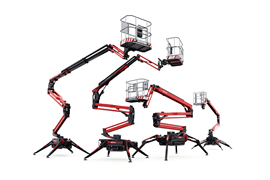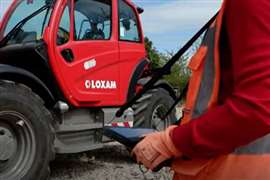How equipment rental affects construction productivity
01 September 2019
Is rental helping to combat the decline in construction productivity, or is it part of the problem? Kevin Appleton examines the issue.
One of the perplexing features of economic reporting over the past couple of decades has been the stagnation of, or decline in, productivity in the construction sector right across the developed world (the UK has been a modest exception to this, but even there certain sub-sectors have registered declining productivity too).

This has been against a backdrop of generally rising industrial productivity across the same territories.
With the rental industry closely linked with construction, we must ask ourselves; have we been helping to fight against this negative trend or are we part of the problem?
Also, is our own house in order, productivity-wise? Or are there major opportunities we should be grabbing?
I’m not sufficiently skilled or knowledgable to speculate at length over why productivity (measured as “labour costs as a percentage of gross value added” for the purposes of this article) will have stagnated.
However, contributory factors must include an ever-increasing construction complexity, due to the technical demands of new buildings, which has not been successfully converted into stronger construction pricing.
How the complexity of projects can contribute to construction industry productivity decline
One of the most famous examples of the effect of uncontrolled complexity on construction productivity is Berlin-Brandenburg Airport (BBA). This showcase project was commenced in 2006 and had a planned opening date of 2011.
The latest best estimate is for it to actually open in 2020, with 2021 frequently quoted as a more likely date. Project costs are set to be around 200% higher than the original budget.
The smarter we require buildings to be, the smarter the design, control and forethought that’s required to execute the construction.
BBA is an extreme example of what happens when this goes wrong, but it’s a common event for major projects to exceed both time and cost budgets, none of which is helpful for productivity.
How equipment rental impacts the cost of construction projects
It could also be that, technically, the rental industry has contributed to an apparent decline in construction productivity. The “added value” part of the productivity calculation subtracts bought in costs from overall revenues.
If construction businesses have been progressively switching from owning equipment (generally not a bought-in cost) to renting equipment (always a bought-in cost) then this has the effect of suppressing the “added value” side of the calculation.
At the same time, of course, construction companies have avoided billions of dollars in capital expenditure on equipment, but this doesn’t show up in our productivity measures.
Other areas of outsourcing can have a similar downward impact on construction productivity measures, even though they may be very sensible from a cash management and capital returns perspective.
The question to ask, of course, is “what can we do about any of this?”
If the hypothesis is true, that project and technical complexity is a downward pressure on productivity, then surely finding better ways to get to grips with that complexity becomes a substantial priority.
At the same time, finding ways to eliminate non-added-value activities from construction activities will provide the long-term downward drive on labour costs that drive one part of the productivity equation.
The answer to both of these things is to be found in the deployment of better collaboration tools to engage all parts of the supply change in a smooth and efficient process.
How digitalisation can increase rental and construction industry productivity
Digitalisation has the capacity to transform productivity in construction (as elsewhere) through ensuring that all parties have visibility of what is required, where and when, without substantial human intervention or judgement (until something goes wrong or doesn’t look right).
Past studies have shown that the same construction task performed under the same conditions by two different work crews can have productivity differences of up to 75% (i.e. one group is 75% more efficient in completing the identical task).
The differences are seemingly down to skills, organisation and planning, rather than the relative willingness of the two crews to work.
Digitalisation means that tasks can be scheduled and resourced to the needs of the individual worker (and even training can be supported in this way), which could have a substantial impact on closing the wide productivity bandwidths that presently exist.
Imagine if all of the time currently taken on surveying, ordering, off-hiring, account queries, maintenance checking and so on was completely automated. That would represent a huge gain for both rental and construction businesses.
[Click here to read Kevin Appleton’s article on digitalisation and digitisation]
Why recruitment is so important
Of course, the success of operational collaboration and planning depends on excellent project visioning and leadership at multiple levels.
It could be that one of our industry’s challenges is recruiting talent. Indeed, the rental sector has been rather unsuccessful in the war for talent, compared to other, superficially “sexier” industries.
For any business, or industry, to grow efficiently it needs to have visionary, creative and inspiring leaders.
This is the first place for us to go, it seems to me, for us to begin the reversal of our productivity woes.
For guidance on how to recruit rental sector employees, click here.
*This article was first published under the title ‘The Productivity Conundrum’ in the Setember 2019 issue of IRN magazine. To download it and or other issues, click here.

About the author He is a former CEO of Lavendon Group and a chairman and/or non-executive director of a number of companies in the rental and logistics sectors. To comment on these articles, e-mail: [email protected] |
STAY CONNECTED



Receive the information you need when you need it through our world-leading magazines, newsletters and daily briefings.
CONNECT WITH THE TEAM











